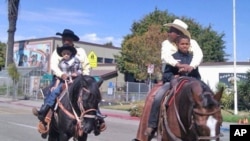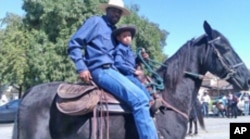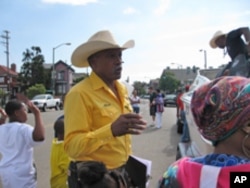Thanks to Hollywood, the word "cowboy" conjures up images of tough, independent men: solitary, weather-beaten and...white. But many of the Old West cowboys were African-American.
Each October, the Black Cowboy Parade in Oakland, California celebrates the role African-Americans played in settling the West after the Civil War of the 1860s.
Cowboy parade
This year's Black Cowboy parade was led by African-Americans on horseback, sitting tall in their saddles, wearing cowboy hats, boots, chaps, spurs and big shiny buckles.
Oakland is a major metropolitan area in the San Francisco Bay Area and the sight of cowboys trotting down its inner-city streets may seem out of place in the 21st century. But the Black Cowboy parade has been held here for the past 36 years. It's the only parade in the country that celebrates the contributions of African-American cowboys.
Wilbert McAlister is president of the Oakland Black Cowboy Association, the parade sponsor. He says term "cowboy" was originally coined by southern plantation owners before the Civil War.
"You had the house boy that work in the house and the field boy that work in the field. But the barns that houses the cows and horses--someone had to go out there and clean up," says McAlister. "So now they had to have another boy to take care of the cows, take care of the horses, to sleep with the cows out on the prairies because they didn't have any fences. So them boys there, they were called 'cowboys.'"
Black cowboys
After the Civil War and emancipation, many black cowboys took their skills with horses and cattle and headed west. They became cattle herders, cooks, ranchers, and rodeo riders. McAlister is a descendant of Texas cowboys and ranchers. He estimates that almost one-third of range cowboys were African-American.
"It was black cowboys that come out here, that bring food for people, and to have a settlement of a town and make a way for Americans," he says. "That's a contribution and they don't want to give us credit. But we were part of that movement."
Randy Harris, a rancher and horseman in California's Central Valley for the last 10 years, has attended almost every black cowboy parade. He joined the Oakland Black Cowboy Association two years ago.
"I grew up watching all the westerns. And there was a time period during the 60's and 70's, there was a western on every night of the week," says Harris. ""Bonanza" on Sunday, "Maverick" or somebody on Wednesday, "Wagon Train" - Caucasians, you know. So again we're left out of the history books and television."
Reviving the legacy
The Oakland Black Cowboy Association is doing its part to rectify that omission. Although most OBCA members do not work as full-time cowboys, some are ranchers and others are simply horse enthusiasts. Many of them can trace their lineage to cowboys from the old South. They keep the memory of black cowboys alive by doing educational programs for schools, churches and neighborhood groups in northern California.
As part of their presentation, they arrive wearing full cowboy gear and sometimes bring their horses. Most of the children have never seen a horse or ridden on one. Harris believes horses have the power to connect with children. He recalls a group of hardened inner-city kids who visited a stable in the nearby city of Richmond.
"They come in and their pants were sagging and looking at each other cross-eyed. But, by the end of the day, their pants were up and they were helping each other deal with the horse," says Harris. "They forgot where they came from because they had a common goal."
Harris would like to see the Oakland Black Cowboy Association expand its educational mission and become more involved with community service and families. In fact, the OBCA is now trying to establish a mentoring program for young children with its members serving as positive role models.







